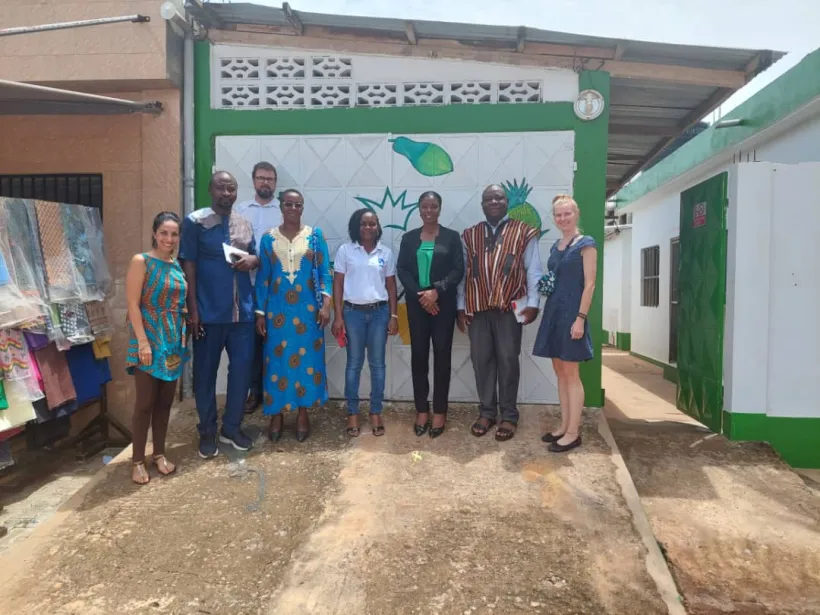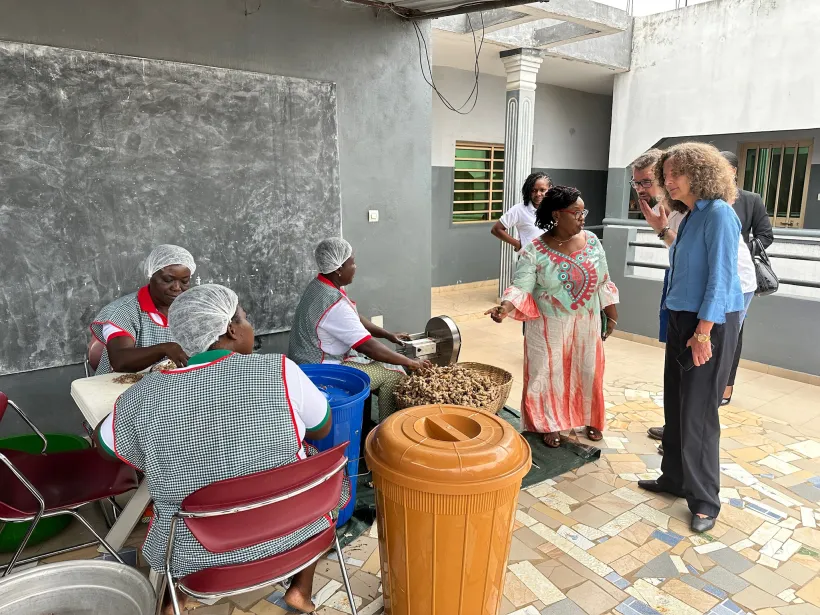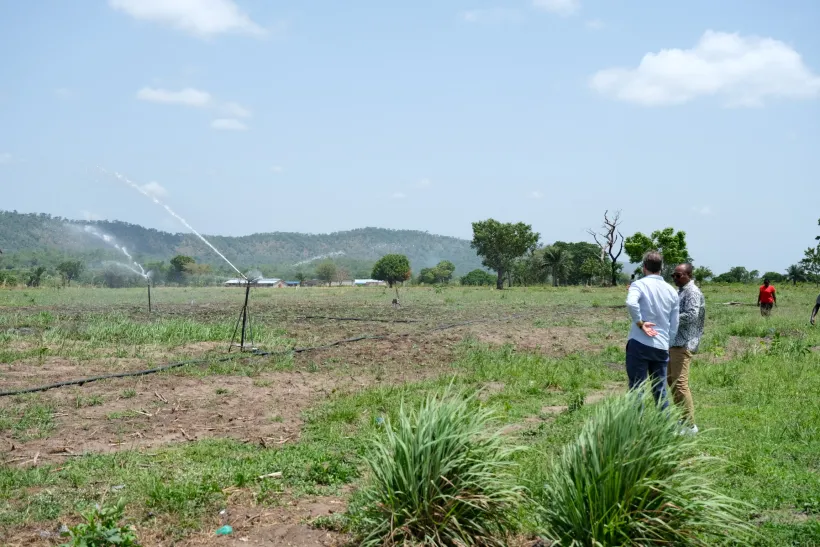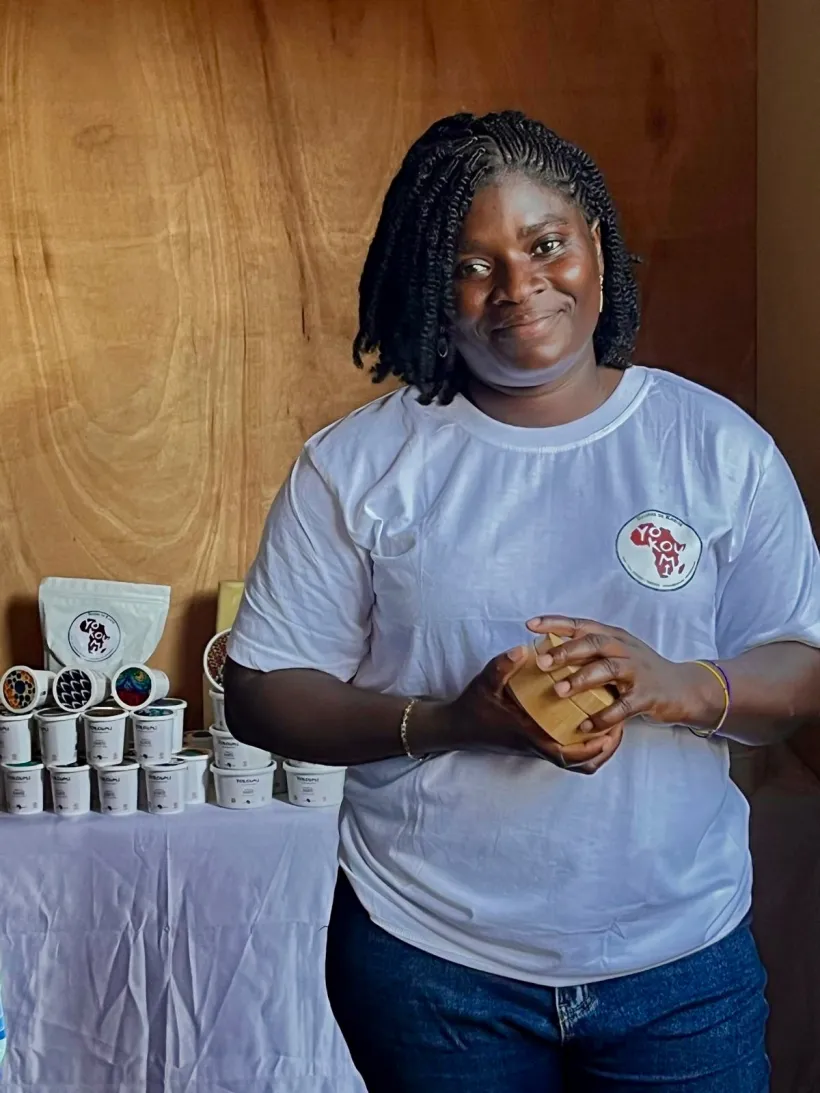Representatives of the MPDC, European Union, German Embassy and GIZ, visit projects supported by WIDU.africa in Togo
On Wednesday 03 and Thursday 04 April 2024, four WIDU entrepreneurs met representatives of the MPDC (Ministry of Planning, Development and Cooperation) -Mr. Léo TAMAKLOE and Mr Gbemu AHOSE-, of the European Union -Mrs ARUNA ROSHANIAN-, and of the German Embassy -Mrs Camilla GENDOLLA. Representatives of these institutions joined teams from GIZ -Mrs Inge BAUMGARTEN, Resident Director, Ms Clara GOTTSCHALK, Portfolio Manager-, and the WIDU project -Tom SORENSEN, Regional Coordinator, Ms Sophie MARQUARDT, Technical Advisor, Ms Sylvie AMOUZOUGAN-GOUDJO and Ms Ami TAMEKLOE - to visit these four Togolese entrepreneurs in the regions of Lomé, Tsévié and Atakpamé.
The delegation discovered with great enthusiasm and interest the production units of entrepreneurs ANIKA LAWSON (Projet PHILAB), KPEMISSI Solim (Projet FRUITS OF AFRICA), BOSSOU Kokou (Ferme BKM) and ADEDJE Délali (Projet YOKOUMI). These field visits were not only an opportunity to discover the inspiring activities and backgrounds of these entrepreneurs, but also to understand the challenges they face as entrepreneurs and how a support program such as WIDU helps them to overcome these difficulties.

In Amadahomé, Ms ANIKA LAWSON, founder of PHILAB, captivated the entire delegation with her spice production company. After meeting with a spice producer accidentally few years ago, Anika began her entrepreneurial journey at the age of 53 with just 20,000 francs of self-financing. During the visit of her company, the self-taught entrepreneur inspired all of the visitors as she recounted how she developed the production of a simple spice to a factory producing over 35 different spices as seeds, capsules, powders and teas, in only 4 years. Following the principle of “forward production”, from receipt of raw materials to finished products, the entrepreneur was able to obtain the HCCP certification. WIDU has made a major contribution to her company growth, helping her not only through coaching tailored to her needs, particularly in terms of accounting, but also by subsidizing the acquisition of a bagging machine, hulling machine, boxes, plastic bags, raw materials and cardboard packaging that have enabled her to stand out from the competition.
Read the full story here: https://widu.africa/fr/success-story/philab?mtm_campaign=SuccessStory-PHILAB-Apr-TG

Mrs. KPEMISSI Solim, promoter of FRUITS OF AFRICA, a company specialized in the transformation of fresh fruit into juice and dried fruit, was also honered by the MPDC delegation's visit, the European Union and the WIDU teams to her premises. This visit enabled her to share the story of her company, and how its idea was born. Passionate about mangoes since childhood, she was distressed at not being able to find them out of season and seeing them rot during their peak season. After discovering dried mangoes, she tried to find ways of preserving these fruits for a long time, so as to make them available in all seasons. She trained in this trade in Burkina Faso before submitting her project to a PASA call for tenders, which enabled her to acquire her first dried fruit production equipment. Because she wanted to specialize in a specific product and link her brand image to it, she chose pineapple, a very juicy fruit available mainly in Togo. WIDU came at just the right time to support Solim's dream of producing fruit juices within everyone's reach. With the support of WIDU and its donor from the diaspora in Germany, Solim has been able to increase her production capacity from 500 kg to 1.5 tons, using a factory that complies with hygiene requirements, modern materials, and trained staff. This has enabled the company to meet the challenge of getting closer to its target.

On Thursday April 04, Mr. BOSSOU Komi Koko, welcomed a delegation from MPDC, GIZ and WIDU to his BKM farm in Atakpamé - Adjigo; an opportunity to recall why a few years earlier he launched his agricultural project. Komi Koko had a passion for agriculture from an early age and didn't hesitate to buy 20 hectares to set up his project in an area without electricity or public water supply. Trained as a computer engineer, he was able to implement technology in his agricultural work to overcome these obstacles by installing surveillance cameras, solar panels, a generator and the construction of a drilling. WIDU has supported him in the growth of his farm irrigation project. Today, he produces food crops such as maize, sorghum, groundnuts, rice, cassava and market garden produce such as adémè, chillies, tomatoes, etc. He has made remarkable progress thanks to the drone he acquired which today helps him to treat his plantations, as well as power tillers to counter the lack of human resources. The delegation was impressed by the size of his project, which requires a lot more funding, and didn't hesitate to share a few ideas for solutions with the entrepreneur.

On the afternoon of April 04, 2024, the YOKOUMI (shea butter) project piloted by entrepreneur ADEDJE Kossiwa Délali ended the delegation's tour in Tsévié. A few months ago, she discovered shea butter production during a tourist visit. That was the first step of her project idea. Specializing in shea butter production in Sokodé and packaging in Tsévié, the company has so far empowered over 300 women in the Tsévié region and created 5 seasonal jobs. Having started with her own funds, the entrepreneur was facing challenges of getting the ECOCERT certification, building her premises, acquiring equipment and other challenges, which she was able to overcome thanks to the support of WIDU. So far, the entrepreneur has considerably increased her production capacity from 25 liters to 25 tons of shea butter. In her packaging unit, she filters the shea butter received from Sokodé to eliminate waste before packaging it in jars with carefully cut pieces of “pagne” (traditional textile). Some is also packaged in 25 Kg cartons for cosmetics producers. Discussions on the various challenges facing the entrepreneur, including the mechanization of production, rounded off the visit.
At the end of the visit, representatives of the support institutions and international organizations were able to testify the impact of WIDU on the Togolese entrepreneurs. The multiplier effect of technical and financial support has been remarkable for these different projects, but there are still challenges to be met, and these will be the subject of reflection for the various ecosystem players present in the delegation.